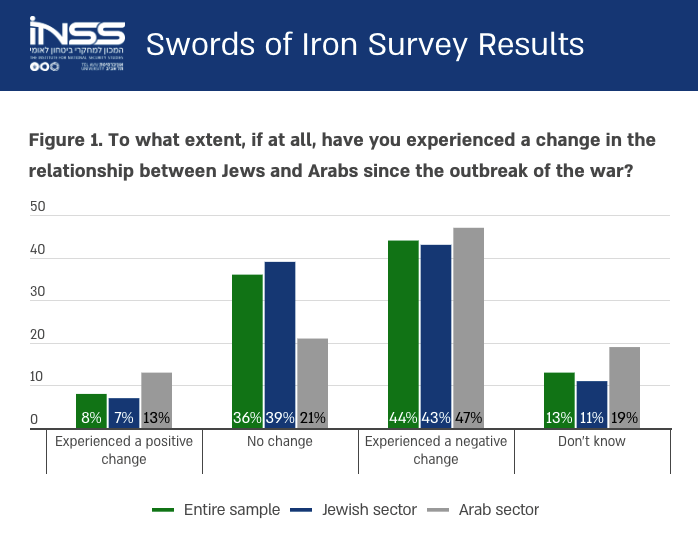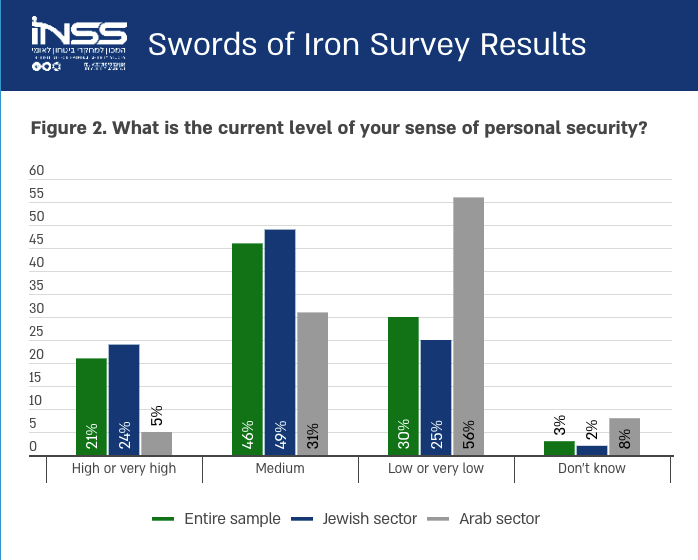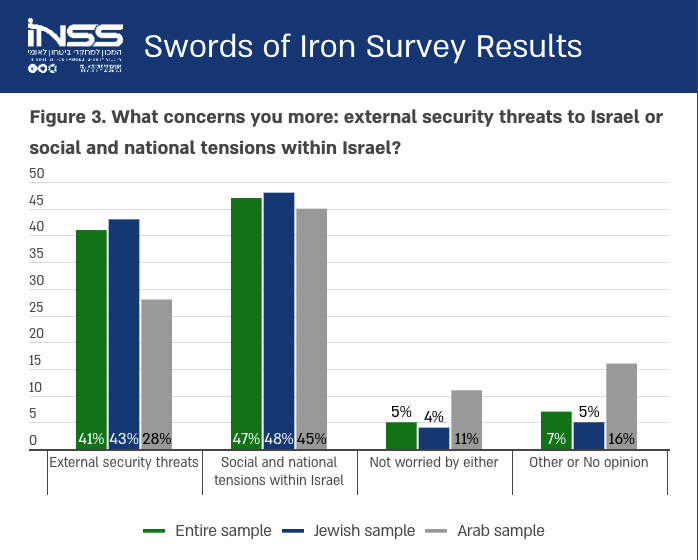Between Restraint and Protest: Arab Society in Israel After Seven Months of War

INSS Insight No. 1854, May 19, 2024
In the seven months since the Hamas attack on October 7, the onset of the war in the Gaza Strip, and increased security tension on several fronts, stable relations between Jewish and Arab citizens of Israel have been maintained, including in the mixed towns and cities. Despite fears voiced by some in the political and security establishment that the war could ignite widespread clashes between Jews and Arabs, it has not happened—even during the traditionally tense month of Ramadan and the Eid al-Fitr holiday. Most Arab citizens of Israel want to continue their routine lives as an integrated minority in Israel and reject Hamas and its ideology. However, given that the emergency situation continues, there are still dangers that could undermine the relations between Jews and Arabs and lead to violent confrontations. These include the distress felt by Arab citizens due to the loss, destruction, and the humanitarian disaster in Gaza; a growing sense of alienation from the State of Israel and its Jewish majority; a decline in personal security caused by crime; the economic situation; and limitations on freedom of expression. Israeli government authorities are responsible for eliminating any factors that contribute to undermining the stability of relations with the Arab society and should work toward enhancing relations with a forward-looking approach, both domestically and in the context of finding a solution to the conflict with the Palestinians when the Gaza war is over.
This article will analyze the factors that could undermine the stable relations between the Arab minority and the Jewish majority in the State of Israel. We will examine seven main elements:
1. Casualties, Destruction, and the Humanitarian Disaster in the Gaza Strip
The images of extensive destruction and the humanitarian disaster in Gaza have significantly affected the Palestinian Arab population in Israel. The more these images become ingrained in their consciousness, the greater the risk to their identification with Israel’s efforts to dismantle the Islamic terrorist infrastructure governing the Strip. While most Arab citizens of Israel do not support Hamas, many do not justify the extent of the Israeli military’s response and the resulting harm inflicted on Gaza’s civilian population, which they see as reminiscent of the Nakba. The prevailing sentiment on the Arab street is that a military operation of the IDF in Rafah will exacerbate the suffering of the Gazan people. The longer this human tragedy in Gaza persists, the greater the anger among the Arab public and an increasing urge to protest against the war. In addition to the strong condemnations by Arab public figures and efforts to increase humanitarian aid to Gaza, there is a possibility that protests, demonstrations, and strikes could escalate into violence. The first signs of this were evident during the processions held in some Arab communities on Land Day (March 30), where people protested against the situation in Gaza and called for an end to the war.
2. An Increasing Sense of Alienation From the State of Israel and Its Jewish Majority
By describing the events of April and May 2021 as a “homegrown intifada” and framing the battle against violence and crime in Arab society as a “war” against a “domestic enemy,” Israeli government officials have distorted the reality of Arab society. This extreme view was also evident in the demands made by several right-wing ministers to restrict Arab citizens of Israel from ascending the Temple Mount during the holy month of Ramadan. These statements portray the entire Arab society as a threat and increase the sense of alienation among Arab citizens, potentially fueling extremist nationalist and religious factions within Arab society.
As shown by Figure 1, approximately 47% of the Arab population has felt a decline in relations between Jews and Arabs since the outbreak of the war.

Figure 1. To what extent, if at all, have you experienced a change in the relationship between Jews and Arabs since the outbreak of the war?
3. Diminished Sense of Personal Security
During the first three months of the war in Gaza, homicides in the Arab sector decreased significantly but have since returned to prewar levels. This is a major concern for Arab society, as they feel that the Israeli government and the police have neglected to manage crime in the Arab sector. Concrete measures have not yet been implemented to address the high level of crime, causing great frustration within Arab society and a belief that the state has not prioritized this issue. The increase in crime and violence in the Arab sector—along with the availability of various weapons, including those used by criminal gangs for mass attacks—poses a real threat to national security. This threat is especially alarming, considering that law-enforcement agencies have limited capacity to tackle the challenge.
The recent relaxation of the criteria for obtaining a gun permit, which has increased the number of Israelis eligible to carry firearms, has also diminished the sense of personal security among Arab citizens. This phenomenon could increase the likelihood of errors and cause citizens to perceive any incident as a terror attack, potentially resulting in innocent people being injured or killed.
According to Figure 2, more than half of the Arab public (56%), which is more than double the rate of the Jewish population, reports feeling a low or very low sense of personal security.

Figure 2. What is the current level of your sense of personal security?
4. The Deteriorating Economic Situation
The war in Gaza has had a negative impact on the economic well-being of Israeli Arabs, with data showing that this sector has been more adversely affected than any other. According to a report by the Bank of Israel, the unemployment rate in the Arab sector has sharply risen since the start of the war, particularly among men. Employment of Arab men decreased by 27% during this period, compared to 11% among Jewish men. Although the Israeli labor market began to recover in early 2024, the recovery among Arab men has been much slower and has only recently reached prewar levels. The employment rate among Arab men aged 26–64 has risen to 75.7% since the beginning of the year, close to the level it was before October 7. The lack of work among young Arabs has also worsened the problem of idle youth.
The high concentration of Arab men in the construction industry, which experienced a significant slowdown during the first few months of the war, particularly affected their employment rate. Employment in other industries also suffered due to concerns raised by both Jewish and Arab employees. Surveys indicate that both groups feared that workplace interactions after October 7 would undermine their sense of personal security. These concerns have also harmed Arab-owned businesses, which are not included in the unemployment figures. These businesses have reported a significant drop in demand from Jewish consumers, driven by calls on social media for Jewish Israelis to boycott Arab businesses.
In addition, budget cuts by Israeli ministries have affected the five-year plan for Arab society, resulting in a 15% reduction in budgets allocated to the Arab sector. These funds were intended to address years of neglect. In the short term, these cutbacks will harm Arab society, and in the long term, they will reduce Israel’s national income and economy.
5. Greater Restrictions on Freedom of Expression and an Increased Sense of Persecution
Within Arab society, there is a sense of persecution by the state, including the law-enforcement agencies. Israeli Arabs believe that the state consistently demonstrates its undemocratic nature in its treatment of Arab citizens. Monitoring social media posts by Arab citizens—especially influential figures like Prof. Nadera Shalhoub-Kevorkian—is seen as an attempt to limit freedom of speech and academic freedom. Additionally, there have been reports of some Arab students being permanently expelled from institutions of higher education and Arab employees being dismissed from jobs in various sectors.
6. Provocation and Attacks by Extreme Nationalists—Jewish and Arab
As a whole, Arab society in Israel rejects extremist ideologies and does not support the recent terrorist attacks carried out by Arab citizens. However, radical groups within Arab society have a significant presence among young people and on social media platforms. There is a concern that as the war continues, protests and disturbances could increase, leading to clashes between radical, nationalist, and religious groups, as well as young people with criminal backgrounds who may exploit the situation for criminal purposes.
Far-right Jewish groups within Israel openly hold anti-Arab views. These individuals, fueled by the legitimacy given by some senior government officials, view Arab citizens as part of the “Palestinian enemy” and are willing to engage in confrontations with them under the pretext of defending Jews. The widespread acquisition of weapons by Jewish Israeli civilians since the start of the war further heightens tensions and increases the likelihood of violence between Jews and Arabs. To address this issue, it is crucial for law-enforcement agencies, such as the police, to block these radical groups and prevent them from incitement.
Figure 3 reveals that 45% of the Arab public is more concerned about social and national tensions within Israel than external security threats. In contrast, only 28% of the Arab public is more worried about external threats to the State of Israel than social and national tensions.

Figure 3. What concerns you more: external security threats to Israel or social and national tensions within Israel?
7. The Impact of Social Media Platforms and Foreign Arabic Media on Arab Society
Most Arab citizens of Israel do not rely on Israeli television stations for news and information. About half of them have satellite dishes, enabling them to consume news from foreign television stations broadcasting in Arabic, primarily Al Jazeera, which broadcasts from Qatar, and the commercial station Musawa in Ramallah, targeting Israeli Arabs. These channels provide detailed coverage of the casualties and destruction in the Gaza Strip, which is not shown on Israeli channels.
Furthermore, social media platforms within Arab society play a significant role in expressing compassion and solidarity with the people of Gaza, along with calls to include them in prayers, especially during Ramadan. This discourse is characterized by considerable anger toward Israel’s military operation and promotes “resistance” as a means to end the occupation.
Conclusion and Recommendations
The relationship between the Jewish majority in the State of Israel and the Arab minority directly affects national security. There is a strategic danger that the situation could escalate into violence between Jews and Arabs, turning the entire country into a battleground. The state authorities should work to eliminate those factors that could undermine the stable relationship with Arab society and work to strengthen and advance relations for the future. This approach is based on the belief that restrained and prudent relations could lead to a possible agreement between Israel and the Palestinians after the war in Gaza is over.
Therefore, the state should take immediate measures to shape public perception and preserve domestic stability. Increasing economic assistance to Arab regional councils, businesses, and those in need will have a positive impact. This should be done alongside efforts to safeguard freedom of speech, address crime and violence, restrain radical elements on both sides, and prevent attacks or clashes between Jews and Arabs that could spark nationwide violence.
________________
* Mohammed Wattad, Esteban Klor, Moran Deitch, Ilham Shahbari, and Rebecca Meller contributed to this article and the data collection.
Col. (res.) Dr. Ephraim Lavie is a visiting senior researcher at the Institute for National Security Studies and a research fellow at the Moshe Dayan Center for Middle East and African Studies. In 2009-2010 he managed the Konrad Adenauer Foundation program for Jewish-Arab cooperation within the framework of the Moshe Dayan Center at Tel Aviv University, and between the years 2007-2020 he headed the Tami Steinmetz Center for Peace Studies at Tel Aviv University.




